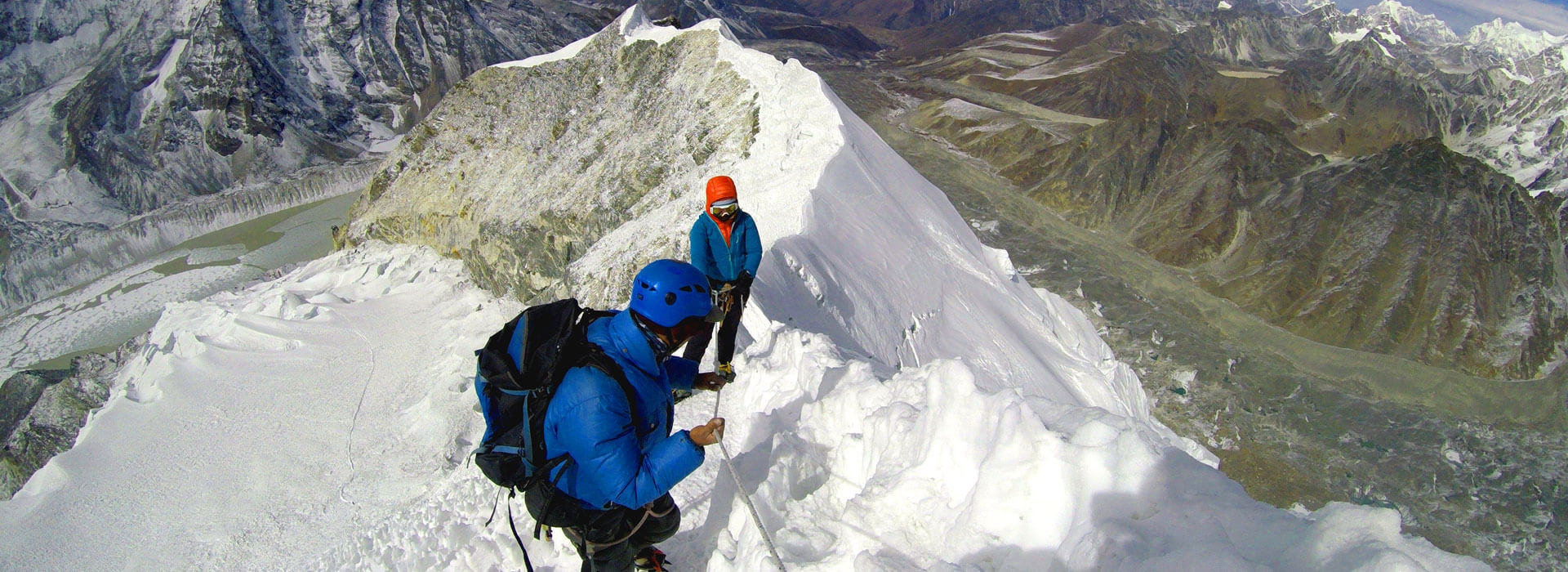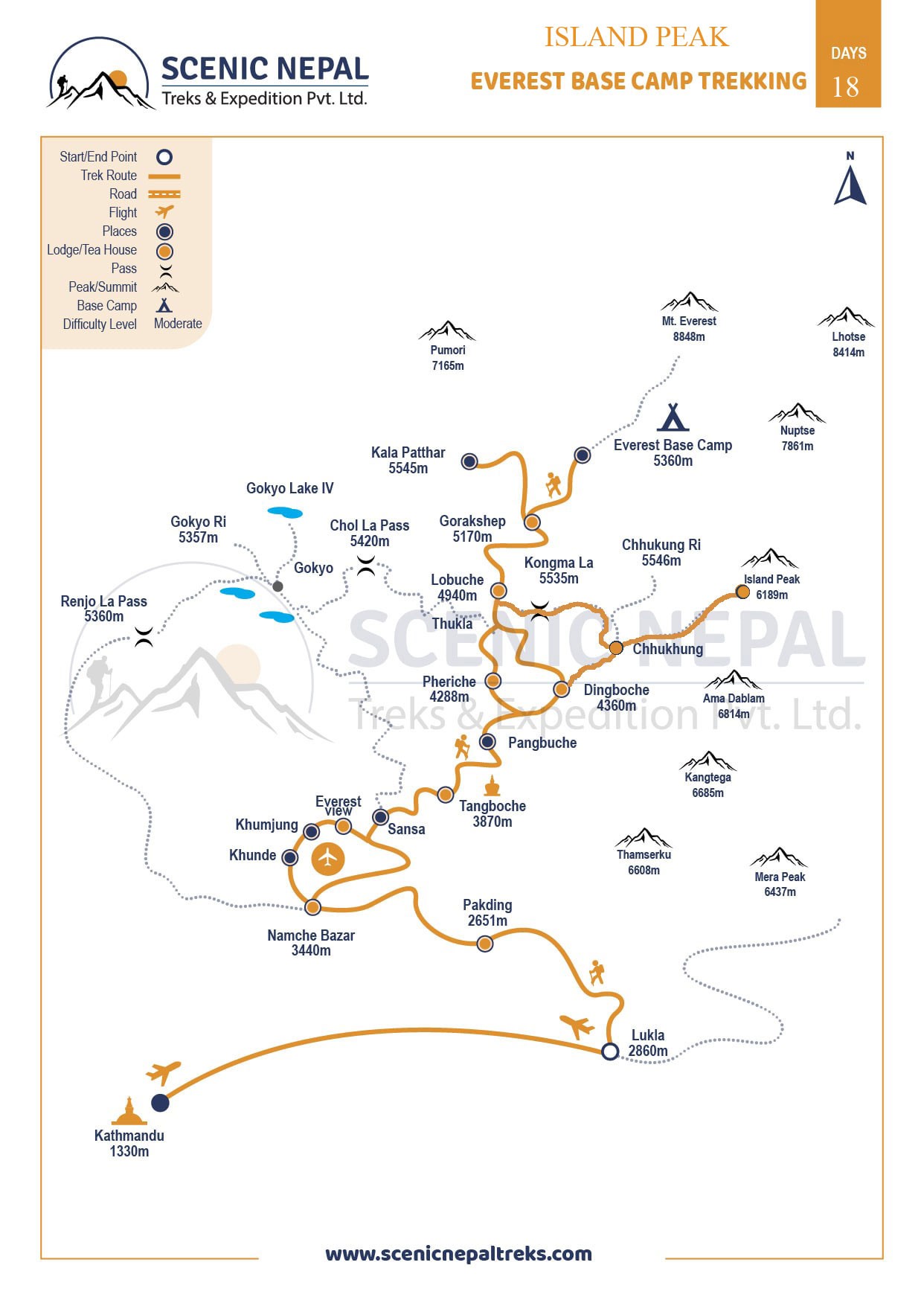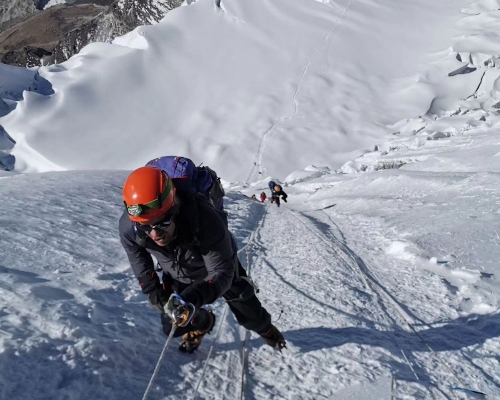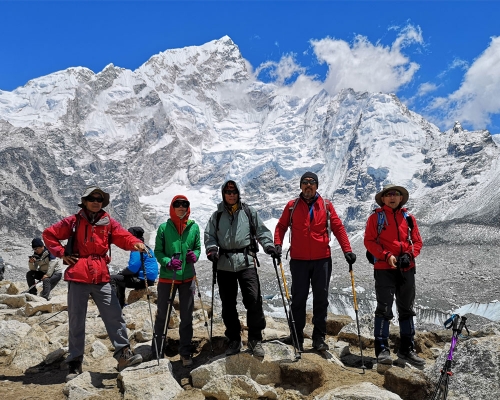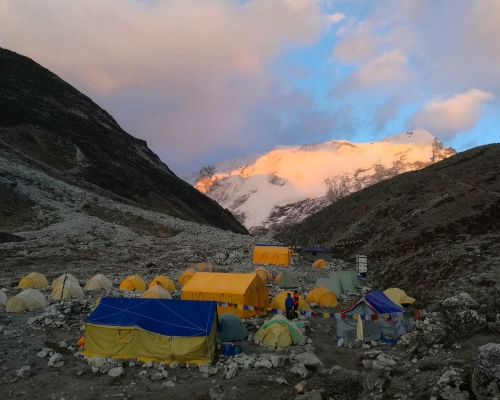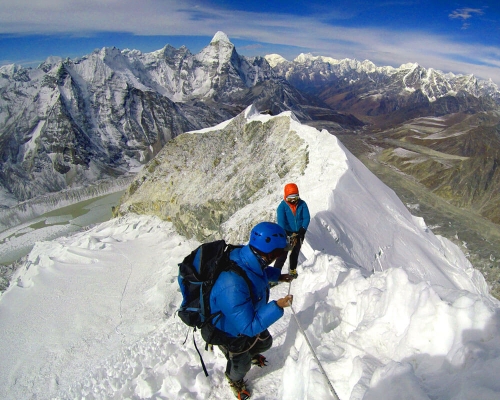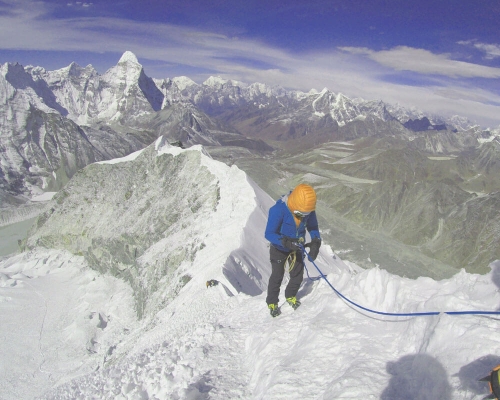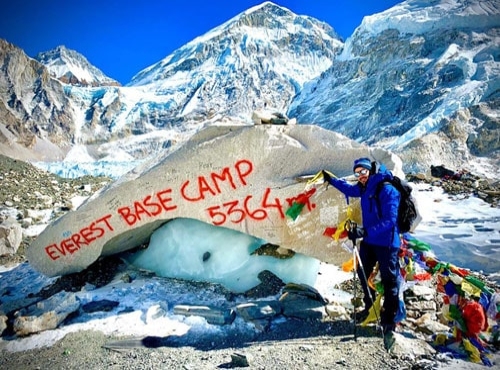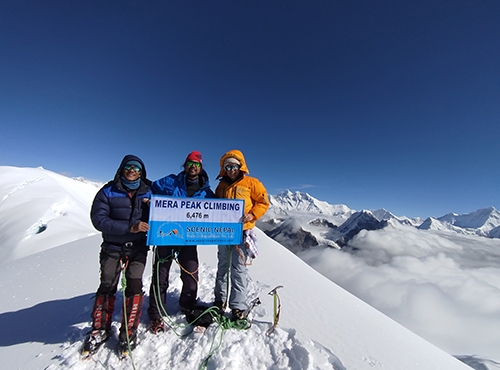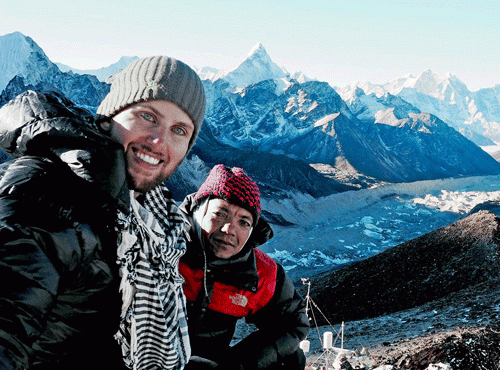Lukla Flight and Cancellation
Flight delays and cancellations frequently occur to/from Lukla airport. Situated at 2,846 meters, Lukla airport is quite at a high altitude, which makes landing and taking off from the airport very difficult. Therefore, all the flights are scheduled in the morning.
As the weather keeps changing at the high elevation, we cannot do anything about it. The flight from/to Lukla airport can get canceled or delayed even at the last minute, so we have a contingency day during the trip. It will give us time to catch the next possible flight and stay on the itinerary.
If we get out of all the options, we can also arrange a helicopter for you to fly from/to Lukla airport. Do know that you have to pay for the charges of the helicopter which will be between US$ 500 to US$ 600 sharing basis.
Island Peak Climbing difficulty
The climbing difficulty of Island Peak is moderate. The route to the top of the peak involves little technical climbing, which will be no big deal for active trekkers under the guidance of our professional climbing guides.
The trekking route has constant ups & downs on the steep, rocky, and forested path. Likewise, you have to walk on snow ridges. The overall journey is for sure challenging. You have to walk 5 to 7 hours daily. Therefore, we highly suggest practicing long walking before the beginning of the trek.
Acclimatization and Altitude Sickness
Island Peak Climbing is a high altitude journey, therefore there is always a chance of altitude sickness. However, with our Island Peak Climbing itinerary, you will be able to acclimate your body before pushing towards the summit.
Our itinerary has ample rest days, involves several hikes, and maintains a steady increase in elevation, which will keep you away from altitude sickness. At the same time, our crew will keep checking the health of every member of the group.
For your information, altitude sickness is commonly faced by travelers, and if it is handled on time, then there is nothing to be worried about. Altitude sickness is also known as acute mountain sickness. It happens if the body sees a sudden elevation change and does not acclimate properly.
Symptoms of altitude sickness
If you happen to get any of the above symptoms, then inform your team leader and take necessary precautions immediately. You may have to take pills or descend to a lower elevation to suppress the symptoms. Once you will feel better, you can move on with the journey. If the situation gets out of hand, then the team leader will decide the next step.
Preventive measures of altitude sickness
Take care of yourself during the venture. Eat a balanced diet and keep yourself hydrated. Other than water, also take other fluids like soup, tea, etc to maintain the hydration in your body. A dehydrated body can lead to altitude sickness.
If you see any symptoms, then inform your guide and follow his guidance. We suggest you not push your body and take a rest whenever it's necessary.
Do not consume hydrating things like alcohol or smoke.
Required Fitness Level for Island Peak Climbing
Everest Base Camp Trek with Island Peak Climbing is designed for beginner climbers to introduce them to climbing in the Himalayas. If you love adventure and are up for challenges, then reaching the summit of Island Peak will be the beginning of great achievements in your life.
Even if you do not need previous climbing experience, you have to be an active trekker to join the trip. Your physical fitness and mental determination are very important. And to support your perseverance, our expert crew will do everything to take you to the summit.
If you are sensitive to anything or possess any underlying medical conditions, then do inform us priorly, so that we can prepare for any possible event.
Pre Training Before Climb
At least 3 to 4 months before the beginning of the Everest Base Camp Trek with Island Peak Climbing, you have to begin preparing for the journey. Regular exercise will not be enough to make your body ready for climbing Island Peak.
Your training should focus on aerobic conditioning, elevation training, and strength endurance. You have to be comfortable carrying a daypack uphill for 6 to 7 hours a day. Likewise, a full-body workout twice a week will also benefit.
Aerobic training is the best way to teach your body to function under less oxygen, which will be very beneficial during a high-altitude trek. Similarly, elevation training will strengthen your muscles to handle the elevation gain.
We highly recommend you to go on hikes or long walks for at least 8-12 weeks (one day per week) before the trek. The main tip here is to focus on duration rather than distance. If you do not have hiking trails around you, then you can walk hill intervals on a treadmill and stair stepper 2x per week.
Swimming, jogging, walking, and cycling will train you to keep up with your breath and increase cardio endurance. If you can, try to prepare yourself in a similar condition that you will face during the Island Peak Climbing. Hike on rugged trails wearing hiking boots and a daypack.
You will not want to wear uncomfortable new pairs of hiking boots during the trek. Get your gears ready and early and get used to them. Make sure to have a finger's width of space between your toes and boot.
Island Peak Climbing Solo/Private/Group
You can do Island Peak Climbing in a group or solo. During the Island Peak Climbing solo, you will be accompanied by our professional climbing guide and a porter. Likewise for group climbing, you can join one of our departure dates or climb with your own group. Group climbing cost a little less than solo climbing. And we also offer discounts from time to time on group climbing.
Best time to do Island Peak Climbing
Weather is a crucial factor that determines the success of the summit push. There are specific months that are considered the perfect time to climb a mountain in the Himalayas. And you cannot climb Island Peak or any other peak in the off-seasons.
March to April (Spring)
Spring is the best time of the year to climb Island Peak. The weather remains favorable, which guarantees a successful summit. Likewise, as the days begin to warm up, the temperature remains quite mild. The clear skies allow excellent mountain views. The temperature ranges from 18°C to -12°C. It means you may feel cold at night and in the morning.
The lower part of the trekking trail passes by lush forests bloomed with rhododendron and many other flowers. The flora and fauna once again begin to thrive, making the trail exotic. You can see many trekkers and climbers along the route.
September to October (Autumn)
Apart from spring, autumn is also one of the best times to go on Everest Base Camp Trek with Island Peak Climbing. The weather remains stable with a moderate climb, perfect for climbing. The temperature ranges from 20°C to 5°C. With the increase in elevation, the climate gets quite cold. Likewise, morning and night are colder comparatively. The crystal clear sky, warm climate, and breathtaking views make autumn a preferred trekking/climbing season in the Himalayas.
Everest Base Camp Trek with Island Peak Climbing Permit
To go on Everest Base Camp Trek with Island Peak Climbing, you have to take three permits, Khumbu Pasang Lhamu Rural Municipality Entrance Permit, Sagarmatha National Park Entry Permit, and Nepal Mountaineering Association Permit.
- Khumbu Pasang Lhamu Rural Municipality Entrance Permit cost: Nrs 2000 per person
- Sagarmatha National Park Entry Permit cost: Nrs 3000 per person
- Sagarmatha National Park Entry Permit cost for SAARC nationals: Nrs 1500 per person
- Nepal Mountaineering Association Permit cost in spring: USD 250 per person
- Nepal Mountaineering Association Permit cost in autumn: USD 125 per person
- Nepal Mountaineering Association Permit cost in the off-season: USD 70 per person
*Note: If you want to trek from Jiri, then one more permit is needed- Gaurishankar Conservation Area permit, which costs Nrs 3000 per person.
Accommodation of Island Peak Climbing
During Island Peak Climbing 18 Days, you will stay overnight in the lodges along the route. While trekking, you will pass by many villages, where you will spend nights in a clean and comfortable lodge run by locals. The rooms are small with an attached washroom. Likewise, the rooms are also shared between two trekkers unless you request a single room.
You will get a bed with a pillow and blanket, which may not be enough to keep yourself warm from cold at night and morning. Therefore, do carry a nice sleeping bag with you.
Camping Accommodation while Climbing
During the climbing period, you will sleep in the camps. Our crew will fix tents for you to spend the night. We use high-quality mountain tents to keep us warm and protected during climbing. We will have sleeping tents, a dining tent, and a washroom tent.
Meals
The Island Peak Climbing package cost includes three meals a day. You will get breakfast, lunch, and dinner during the venture. All the meals are provided as per the menu of the lodge while trekking. The menu is diverse, and you can see a range of dishes. Whereas, at the base camp, the meals will be cooked by our trained crew members. We will offer you delicious and nutritious meals while camping to maintain your strength for the summit push.
The breakfast option looks like this- toast, omelet, boiled eggs, sandwich, soup, muesli, sausage, oatmeal, porridge, tea, coffee, etc. Lunch and dinner have options like dal bhat tarkari, veggies, meat curry, momo, noodles, thukpa, thenduk, Tibetan bread, chapati, pizza, burger, etc.
Climb Responsibly
Adventurous ventures like this in nature may affect it badly if we do not care and climb responsibly. We organize eco-friendly trips in the most sensitive environments that promise the security of the natural wonders during our trips.
We make sure no garbage is left behind at the base camp and above or on the trekking trail. Our crew is trained to make sustainable decisions. Similarly, we actively work with local communities to uplift the mountain economy.
At the same time, we also ask and teach our guests little things that they can do from their side to contribute to our mission of eco-friendly trips. From carrying reusable water bottles to buying gear locally, supporting local vendors, and collecting their trash are some of the things our guests do.
Trekking / Climbing Insurance for Island Peak Climbing
You cannot book Island Peak climbing with us until you show proof of travel insurance. Travel insurance is significant for Island Peak Climbing 18 Days because the journey involves high altitude trekking/climbing, potential risk of acute mountain sickness, and other unforeseen medical circumstances.
Your travel insurance should cover emergency air evacuation up to 6,000 meters along with medical bills. Likewise, you can also add flight cancellation and loss or theft of personal properties. For your information, you cannot take out travel insurance in Nepal, so you have to get it in your country.
In case of any emergency during the climbing, travel insurance will help us a lot to offer you immediate medical assistance. The company holds the right to decline to confirm the booking if the travel insurance is not presented.
Island Peak Climbing Safety
Scenic Nepal Treks guarantee the safety and security of our guests during Island peak climbing. You will be guided by a well-trained crew who will take care of you in the Himalayas. As much as we care about your satisfaction during the trip, we also equally give utmost priority to your safety.
During the Island Peak Climbing with Everest Base Camp Trek, we will carry all the equipment and essentials. Our guides have extensive knowledge of technical climbing, remote survival, and first aids. Moreover, our guides have led many climbers to the summit of Island Peak and other major mountains in the Himalayas, which makes them super reliable.
During the climbing period, we provide one Sherpa guide for every two members of the group. They are active trekkers and climbers, so you can trust them with their decisions. At the base camp, we will have medical personnel who will monitor the health of the crew throughout the expedition, so there is nothing to worry about.
Last Minute Booking for Island Peak Climbing
We do have fixed departures for Island Peak Climbing Nepal. However, to join a peak climb at the last minute, you have to meet our requirements. For Island Peak Climbing with Everest Base Camp Trek specifically, you do not have to be experienced with climbing in the Himalayas, but strong physical fitness, determination, and previous trekking experience are a must.
Other than that, you have to show proof of travel insurance and other necessary documents to confirm the booking. Once you meet all of our requirements, we will send you a booking confirmation notice. You have to pay 100% of the package cost to confirm the trip and be available in Kathmandu at least one day before the beginning of the venture to prepare.
Travel Tips (electricity, internet, ATM, luggage, tipping, personal expenses)
- During the trekking period, you can contact your family and friends by using the WiFi services provided in the lodge. They may charge a few extra bucks to let you use the internet. We can also help you get Nepali Sim with data to use the internet on the trail. Do know that the connection might not be stable all the time because of the elevation and weather fluctuation.
- As you will touch high altitude, our city office will stay in touch with all the members of the group at least once a day through a phone. On the base camp and above, we will use a satellite phone to stay in contact with you.
- Carry extra batteries or a solar charger to charge your electronic devices on the way. There are also charging booths in every lodge where you can charge the phone and camera battery by paying a few bucks.
- From Namche Bazar above, there is no ATM, so withdraw ample cash to use during the trek.
- You can take up to 15 KG as your main luggage, which is carried by our porters. Trekkers usually carry a day pack, where you can keep the essentials. If you are left with suitcases or any additional clothing, then you can store them in the hotel's lockers room free of cost for the climbing period. PLEASE note that Lukla Flight allow you only 13 KG luggage and 2 Kg of hand bag.
- Tips for tour guide, driver, climbing guide, and porters are not included in the package cost. It's the travelers' responsibility. If you are happy with the services provided by the crew members, you are free to tip them as much as you want. Most of the trekker's tip as a group after descending or during the farewell dinner.
- Any additional expenses like beverages, snacks, souvenirs, tips, etc are not part of the package cost. Please carefully check our cost includes and excludes section for detailed information.
Trip Checklist:
Important documents and items
- Valid passport, 2 extra passport size photos, airline tickets
- Separate photocopies of passport, visa form (easily obtained at Kathmandu airport), proof of insurance
- Dollars, pounds, or Euros in cash for purchasing Nepalese visa at Kathmandu airport, for paying for restaurants and hotels, for gratuities, snacks, and to purchase your own drinks and gifts
- Credit cards, Bank/ATM/Cash machine cards for withdrawing funds from cash machines (bring a photocopy of your cards), traveler's checks, etc.
Head
- Bandana or headscarf, also useful for dusty conditions
- Warm hat that covers your ears (wool or synthetic)
- Headlamp with extra batteries and bulbs
- Sunglasses with UV protection
- Prescription sunglasses (if required)
Upper Body
- Polypropylene shirts (1 half sleeve and 2 long sleeves)
- Light and expedition weight thermal tops
- Fleece wind-stopper jacket or pullover
- Waterproof (preferably breathable fabric) shell jacket
- Down vest and/or jacket *
- Gore-Tex jacket with hood, waterproof and breathable
Hands
- 1 pair of lightweight poly liner gloves.
- 1 pair of lightweight wool or fleece gloves
- 1 pair of mittens, consists of 1 Gore-Tex over mitt matched with a very warm polar-fleece mitt liner (seasonal)
Lower Body
- Non-cotton underwear briefs
- 1 pair of Hiking shorts
- 1 pair of Hiking trousers
- 1 pair of lightweight thermal bottoms (seasonal)
- 1 pair of fleece or woolen trousers
- 1 pair of waterproof shell pants, breathable fabric
Feet
- 2 pairs of thin, lightweight inner socks
- 2 pairs of heavy poly or wool socks
- 1 pair of Hiking boots with spare laces (sturdy soles, water-resistant, ankle support, “broken-in”)
- 1 pair of trainers or running shoes and/or sandals
- Cotton socks (optional)
- Gaiters (winter only), optional, “low” ankle high version
Sleeping
- 1 sleeping bag (-40 C at least)
- Fleece sleeping bag liner (optional)
- Rucksack and Travel Bags
- 1 medium rucksack (50-70 liters/3000-4500 cubic inches, can be used for an airplane carryon)
- 1 large duffel bag ( Scenic Nepal Treks will Provide you)
- A small daypack/backpack for carrying your valuables should have good shoulder padding
- Small padlocks for duffel-kit bags
- 2 large waterproof rucksack covers (optional)
Personal Climbing Gears ( You can Hire in Chukung)
- Ice Axe
- Crampons
- Harness
- Tape slings (2)
- Screw gate karabiners (2 locks, 2 unlock)
- Descender/eight-figure
- Plastic mountaineering boots
- Ascender/Jhumar
- Helmet
Medical
- Small, personal first-aid kit. (simple and light)
- Aspirin, first-aid tape, and plasters (Band-Aids)
- 1 skin-blister repair kit
- Anti-diarrhea pills
- Anti-headache pills
- Cough and/or cold medicine
- Anti-altitude sickness pills: Diamox or Acetazolamide
- Stomach antibiotic: Ciprofloxacin, etc. Do not bring sleeping pills as they are a respiratory depressant.
- Water purification tablets or the water filter
- 1 set of earplugs
- Extra pair of prescription glasses, contact lens supplies
Practical Items
- 1 small roll of repair tape, 1 sewing-repair kit
- 1 cigarette lighter, 1 small box of matches if you do smoke
- 1 compass or GPS(optional)
- 1 alarm clock/watch
- 1 digital camera with extra cards and batteries
- large Ziplocs
- 1 water bottle (1 liter each)
- 1 small folding knife
- Binoculars (optional)
- 4 large, waterproof, disposable rubbish sacks
Toiletries
- 1 medium-sized quick-drying towel
- Toothbrush/paste (preferably biodegradable)
- Multipurpose soap (preferably biodegradable)
- Deodorants
- Nail clippers
- Face and body moisturizer
- Female hygiene products
- Small mirror
- Personal Hygiene
- Wet wipes (baby wipes)
- Tissue /toilet roll
- Anti-bacterial handwash
